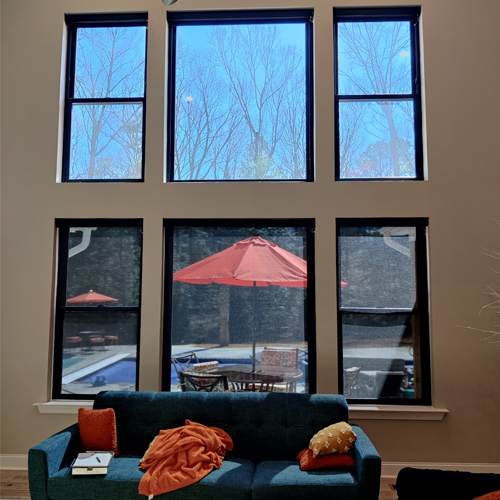Residential Window Tint: Enhance Privacy and Design in Your Home
Residential Window Tint: Enhance Privacy and Design in Your Home
Blog Article
Exactly How Residential Home Window Tinting Enhances Your Home's Energy Effectiveness
Residential home window tinting offers an engaging solution for homeowners seeking to enhance energy efficiency within their space. By applying specialized movies to home windows, it efficiently decreases warmth transfer, consequently maintaining indoor temperature levels and decreasing the requirement for excessive heating or cooling. This not only stops power intake however likewise gives a much more comfortable environment by alleviating glare. Nevertheless, recognizing the nuances of exactly how tinting works and picking the ideal kind for your home can be crucial. Curiously, what variables should one take into consideration prior to making this investment?
Recognizing Home Window Tinting
Understanding home window tinting is essential for house owners looking for to improve both convenience and energy performance in their space. Residential Window Tint. Home window tinting includes the application of a thin movie to the inside or outside surface of glass windows. This movie can significantly regulate the quantity of sunlight and warmth that gets in a home, thus affecting indoor environment conditions
There are various kinds of window tinting films readily available, each with distinctive homes. The effectiveness of window tinting is usually measured by its Visible Light Transmission (VLT) percent, which shows just how much light can pass via the movie.
Benefits of Energy Efficiency
Home window tinting not only enhances appearances but additionally plays a considerable function in enhancing energy effectiveness within property spaces. By minimizing warmth transfer via home windows, tinted films produce a more steady indoor environment, which can bring about substantial reductions in power usage for home heating and air conditioning. This power performance translates into reduced utility expenses, providing house owners with considerable long-lasting savings.

In addition, home window tinting enhances the comfort of living areas. By reducing glow and blocking dangerous UV rays, tinted home windows develop an even more pleasant environment, which can lead to enhanced health for residents. The defense versus UV rays likewise helps preserve furnishings and floor covering from fading, adding to the durability of family things.
Just How Tinting Works
Tinting movies operate via a combination of advanced products and modern technologies developed to manage the quantity of solar power going into a home. Primarily composed of polyester, these movies typically include ceramic or metallic particles that mirror and soak up warm. This dual capability allows them to dramatically minimize the infiltration of ultraviolet (UV) rays and infrared radiation while allowing visible light to travel through.
The effectiveness of window tinting is measured by its solar heat gain coefficient (SHGC), which suggests exactly how much solar power is transferred via the home window. Lower SHGC values are more suitable as they denote greater warmth rejection. Furthermore, home window colors can include a variety of shades, allowing property owners to personalize their visual choices while boosting power effectiveness.
In addition, these movies serve as an obstacle, avoiding warmth loss during colder months by reflecting indoor warmth back right into the home. This thermal insulation effect matches visit the site the cooling benefits obtained during warmer months, contributing to a balanced interior climate year-round. By managing solar power properly, property window tinting not only improves convenience but also plays a vital duty in reducing energy usage and reducing utility expenses.
Choosing the Right Color

There are numerous types of home window films available, including colored, metalized, and ceramic. Ceramic movies give outstanding warm control without compromising presence and are extremely resilient, making them a prominent choice.
Noticeable light transmission (VLT) is an additional crucial variable, as it indicates the quantity of natural light that can go through the colored glass. House owners should pick a color with a VLT that enhances their illumination choices while still giving sufficient glare decrease.
In addition, examining the solar warm gain coefficient (SHGC) can assist determine exactly how well a color can block warm from sunshine. A reduced SHGC shows much better heat control, ultimately boosting power efficiency.
Installation and Maintenance Tips
Correct installment and upkeep are essential elements in taking full advantage of the benefits of domestic window tinting. Professionals likewise utilize specialized methods and tools, which can enhance the resilience and effectiveness of the tint.
Adhering to setup, maintenance is necessary to lengthen the life of the home window film. It is suggested to wait at the very least one month prior to cleaning the tinted home windows to enable the sticky to heal totally. When cleaning, use a soft cloth and a gentle, ammonia-free cleaner to prevent harming the movie. Avoid abrasive products that could scratch the surface.
Resolving these issues promptly can avoid further damage and keep energy performance. By adhering to these installation and maintenance pointers, homeowners can ensure their window tinting continues to offer significant power cost savings and convenience for years to come.
Conclusion
In verdict, residential window tinting functions as a reliable remedy for boosting energy effectiveness within homes. By lowering warmth transfer and obstructing harmful UV rays, window movies add to decrease energy consumption and boosted interior comfort. The choice of ideal tinting products, in addition to correct setup and upkeep, additionally maximizes these benefits. Ultimately, home window tinting represents a sustainable investment that not only decreases utility expenses however likewise advertises a comfy living setting throughout the year.
Window tinting includes the application of check here a slim film to the interior or outside surface of glass windows. By decreasing warm transfer with home windows, tinted films produce an extra stable interior climate, which can lead to significant reductions in power usage for home heating and air conditioning.The effectiveness of home window tinting is gauged by its solar heat gain coefficient (SHGC), which suggests just how much solar power is transmitted via the home window. By managing solar power properly, property window tinting not only improves comfort but also plays an important function in lowering energy consumption and reducing energy costs.
By minimizing warm transfer and blocking unsafe UV rays, over at this website home window films contribute to lower power intake and boosted indoor comfort.
Report this page